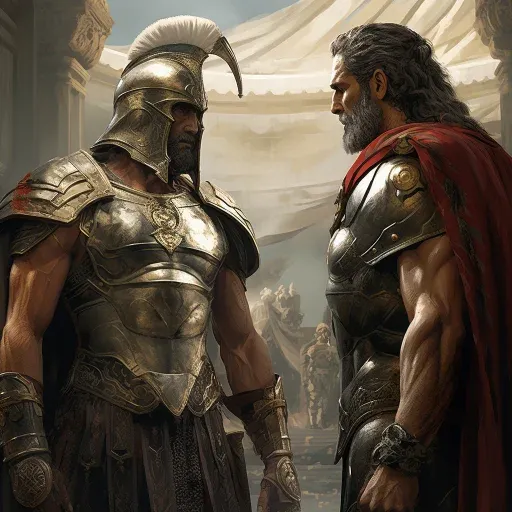BY JAMES BALDWIN
The Ungrateful Guest
Famous Stories Retold: Story 33 of 50

Heading

King’s Justice: When the farmer appealed to King Philip, the king punished the soldier by branding him as "The Ungrateful Guest."
Moral: The story emphasizes the importance of gratitude and the consequences of betrayal.
A good book we like, we explorers. That is our best amusement, and our best time killer
- Roald Amundsen, Explorer
King Philip's Court: The Betrayal and Justice Tale
In King Philip's reign, there unfolds a harrowing tale of treachery and retribution, a tale that echoes through the corridors of time, whispering lessons of gratitude and honour. This narrative spins around a soldier, a benevolent farmer, and their fateful encounter, blurring the lines between savior and villain. A cataclysmic storm, a life saved, a promise made - all ingredients of this riveting saga that culminates in a shocking revelation of deceit and the ultimate branding of "The Ungrateful Guest". Delve in to unravel the beguiling secrets of this historical drama and its timeless implications.
The Soldier's Heroic Deeds and King Philip's Trust
King Philip's trust in one of his soldiers was not an arbitrary decision. The soldier had earned it through his courageous acts on the battlefield. His bravery and dedication not only caught the attention of his comrades but also the king himself. The soldier's commendable deeds had created a solid foundation of trust and respect in King Philip's heart, which later played a pivotal role in the unfolding events.
The Storm at Sea and the Soldier's Rescue
The soldier's life took a dramatic turn when he was caught in a fierce storm at sea. His ship was driven onto the rocks and was tragically wrecked, leaving him half-drowned and stranded. However, destiny had different plans for him. A farmer, living nearby, discovered the soldier in this pitiful state and took him under his care. The farmer's kind-heartedness and generosity gave the soldier a second chance at life. The soldier's life was now tied to the farmer's benevolence.
Podcast
The Soldier's False Promises
As he regained his strength, the soldier expressed his gratitude to the farmer and made a promise. A promise to repay the farmer for his kindness. However, the soldier's words were hollow. His intentions did not align with his words. The promise was only a facade to cover his real intentions - a ruthless ambition that would soon reveal his true character. The soldier's actions following his recovery were a stark contrast to the promise he had made to his savior.
The Soldier's Deception and the King's Grant
The soldier, having recovered from his ordeal at sea, returned to King Philip with a deceitful plot. Neglecting to mention the farmer's role in his rescue, he instead painted a picture of an idyllic farm by the ocean, owned by a churlish farmer who had done nothing for his country. His desire was to own this land.
King Philip, trusting the soldier for his past services, granted him his wish. He was unaware that his decision was based on falsehoods, and that the soldier had just been given the liberty to seize the property of his savior. The soldier wasted no time in driving the farmer out of his home, taking the farm for himself.

The Farmer's Appeal and King Philip's Wrath
Stung by the injustice, the farmer made his way to King Philip. He boldly recounted the entire story, revealing the soldier's deception and the true circumstances of his rescue. The king's trust in the soldier was shattered as he listened to the farmer's tale.
King Philip's wrath was swift and severe. He was furious at the soldier's betrayal, especially when he had shown him such favor. The soldier had not only been ungrateful but had also abused the king's trust for personal gain.
The Soldier's Punishment: The Ungrateful Guest
The soldier was summoned before King Philip, who decided to make an example of him. The words 'The Ungrateful Guest' were burned into his forehead, a constant reminder of his treachery. This was the king's way of ensuring that the soldier's disgrace would be known to all.
From then on, the soldier lived in infamy. His name became synonymous with ungratefulness and deceit. His actions had led to his downfall, and he was shunned and despised by all. His punishment served as a grim reminder of the consequences of deception and ingratitude.
Conclusion
The narrative of "The Ungrateful Guest" underscores the timeless morals of gratitude and integrity, as well as the consequences of deceit and betrayal. It is a poignant reminder that one's actions not only define their character but also carry far-reaching implications. King Philip's harsh justice served as a stark warning that ungratefulness and deceit are severe transgressions. The soldier's branding and subsequent ostracization underlines the societal disdain for such acts. This tale, thus, continues to resonate, reminding us of the enduring values of honesty, gratitude, and honor.





